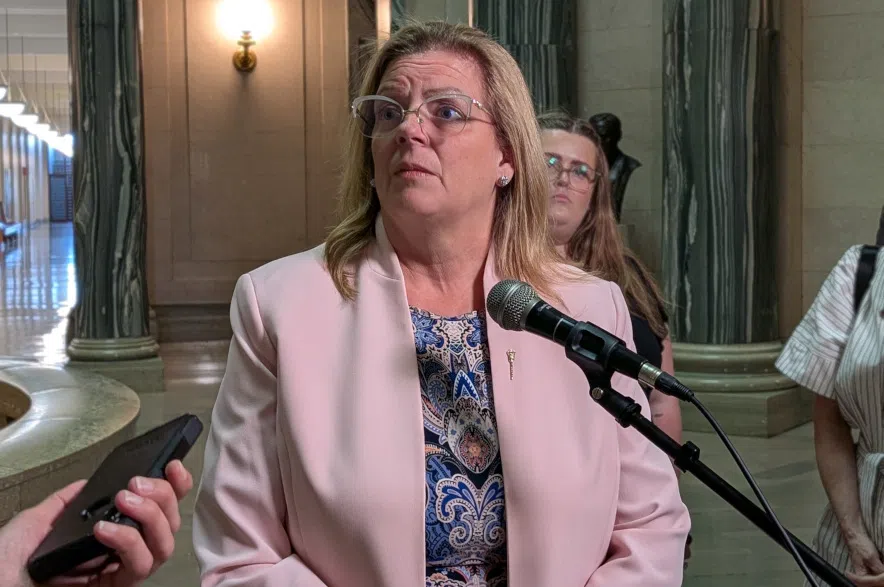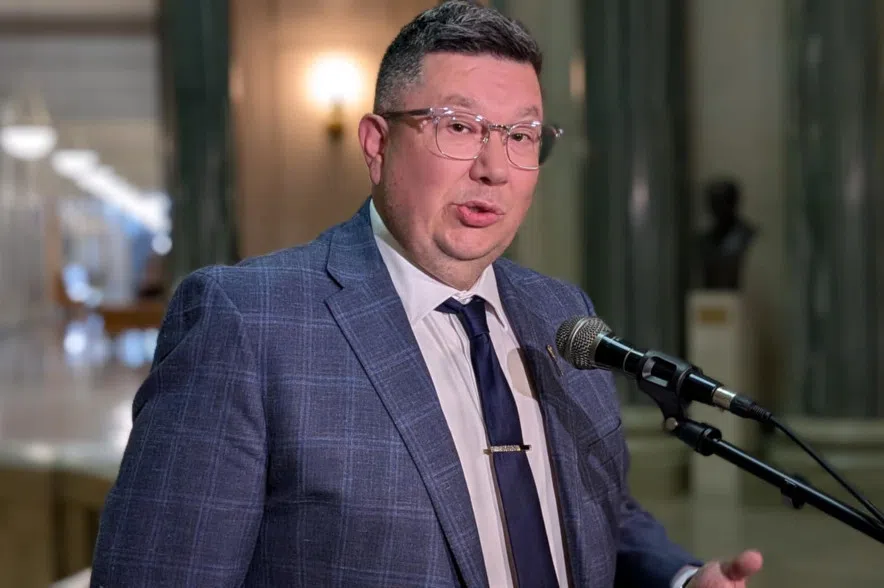Over the past several weeks, the small community of Birch Narrows Dene Nation, near La Loche, has dealt with six deaths.
Two well-respected elders have passed away, and four other community members have died by suicide since then in the community of about 480 people.
Read More:
- Sask. chiefs gather to lend support, share their pain on suicide
- Three years in, is the Pillars for Life suicide prevention strategy doing any good?
- How crucial is it for friends and family to check in on mental health?
“Our community cannot withstand this continuing cycle of loss and grief without substantive intervention and support,” Chief Jonathan Sylvestre said in a statement last week.
“The mental health and wellness of our youth and community members requires immediate action from all levels of government. It’s an issue that has to be dealt with immediately.”
This isn’t the first time the First Nation has dealt with mental health issues. The statement said the Dene nation has been trying to get a community wellness centre built for the last seven years, but each proposal has been blocked by bureaucratic obstacles.
“This pattern of bureaucratic obstruction represents more than administrative inefficiency – it reflects a systemic failure to prioritize First Nation community health needs, and respect community-led solutions,” read the community’s statement.
Sylvestre said the crisis the community is facing would trigger provincial and federal interventions anywhere else in Canada.
The statement said there are critical gaps that demand immediate attention, including a severe shortage of supportive housing, which leaves families in crisis nowhere to go and forces vulnerable people to stay in triggering environments. The community’s leaders said issues around recruiting and retaining mental health professionals has left them without access to essential services.
The statement also noted the need for community safety support to deal with alarming increases in opioid and methamphetamine use, and the need for detox and treatment centres in the north.
Sylvestre said the community has been offered short-term help in the past, but that it tends to go away as the attention does.
“We require substantive long-term solutions with provincial and federal governments, and without it perpetuates this cycle of crisis-response-neglect,” said the chief.
Leroy Laliberte is the NDP MLA for the area, and has also worked with personal and youth development in the community for over a decade, and worked closely with the nation for nearly 20 years.
“It’s not a big community. Everybody knows everybody, and that’s just the way that it is in the northwest. So the communities are getting together to support each other the best way that they know how,” explained Laliberte.
He said the community has been struggling with the losses.
“With communities that really know each other, their family members, their friends, grew up together, it’s definitely impacting them, big time.”
He said the nation has been asking for support right in the community. Right now, services can be hard to access, with members having to travel for up to six hours just to see a counsellor.
Laliberte said the community has brought forward a number of initiatives to help in the north, but has run into red tape every time and nothing’s been done.
“They just wanted the government to listen to them and see what types of ways that they’d be able to support them. They know exactly what needs to be done in their communities and who they’re working with,” he said.
Mental health and suicide crises have been a problem in the north for a long time. Laliberte said he’s been bringing it forward in the legislature, asking for solutions, and so had NDP MLA Doyle Vermette before him.
“The communities in a rich province like ours, they deserve real beds, they deserve real resources and they deserve real services that are going to be provided to these communities,” said Laliberte.
He said the provincial government needs to reach out to the community’s leaders and do what they say needs to be done to address the issues.
“There’s no communities in this province, or across the country, that should be begging for the help,” he said.
“Something this government’s forgetting is the north is part of this province, and they deserve the same services as everybody else in this province.”
Responsibility for health-care services is shared between federal and provincial government on First Nations. Indigenous Services Canada (ISC) said it has reached out to the Meadow Lake Tribal Council, of which Birch Narrows is a member, to offer support.
“We are committed to ensuring that mental wellness resources, including access to therapists and culturally safe supports, are available for those impacted by this tragedy,” Jacinthe Goulet, a spokesperson for ISC, in a statement.
“ISC will continue to work closely with local leaders and health partners to address the community’s urgent needs and support healing during this difficult time.”
The statement listed a handful on supports provided to the tribal council, including treatment centres in two other communities, life promotion and suicide prevention training for 25 people on the tribal council, mental wellness funding, and funding to the Northern Inter-Tribal Health Authority.
Goulet pointed out that ISC funds supplemental programs on reserves, but provinces are responsible for core health services both on and off reserve.

Lori Carr, Saskatchewan’s mental health and addictions minister, and minister for rural and remote health. (Lisa Schick/980 CJME)
Lori Carr, Saskatchewan’s mental health and addictions minister, said the situation on Birch Narrows Dene Nation hadn’t come to her attention before a statement was issued by the NDP earlier this week.
“Up until that point in time I hadn’t heard anything specific about it,” Carr said.
“Obviously now that it’s been brought to our attention we’ll have to look into and see what is happening and what services we can provide.”
Carr said the services could include looking into the availability of counselling in the community – finding out if people are reaching out, who they’re reaching out to and if there needs to be more available.
The minister said everyone in the province can access services like Healthline 811, Kids Help Line, and mobile crisis phone lines.
She said there are also initiatives the province offers throughout the north, including the Roots of Hope suicide prevention program, the Embracing Life Initiative, and funding for land-based camps for youths.
When asked about concerns from the nation’s leadership that help comes, then leaves, putting them in a cycle, Carr said that’s why the programs she mentioned are ongoing through the year.
“I guess it is continuing to be engaged in those programs to ensure that your community is using the resources that are available on an ongoing basis,” said Carr.
Carr said her ministry is working with different First Nations organizations when it comes to addictions and mental health to see about more permanent services with staffing.
The minister was asked about whether the programs are working, given the years-long issues with mental health and suicide, and she said having them in place isn’t hurting, “and the more that we can build on those programs can only help.”
The province’s health human resources plan has incentives for those willing to work in rural and remote areas and in northern Saskatchewan, and Carr said the north is an area where recruitment is a challenge.
“You can’t force people to go an area, so we’ve put the incentives in place. We have the positions available to be able to staff full-time positions in different organizations, and we will continue to do that recruitment,” said the minister.
Carr agreed that more health resources are needed across the entire province, and acknowledged that there’s more work to be done.
If you or someone you know needs immediate support, the Hope for Wellness Help Line is available 24/7 at 1-855-242-3310 or online at hopeforwellness.ca.











